
White House imposes coronavirus travel ban on Brazil
WASHINGTON — President Donald Trump on Sunday further limited travel from the world’s coronavirus hotspots by denying entry to foreigners coming from Brazil, which is second to the U.S. in the number of confirmed cases.
Trump had already banned certain travellers from China, Europe, the United Kingdom and Ireland and, to a lesser extent, Iran. He has not moved to ban travel from Russia, which has the world’s third-highest caseload.
Trump had said last week that he was considering limiting travel from Brazil.
White House press secretary Kayleigh McEnany cast the step announced Sunday as another “decisive action to protect our country” by Trump, whose management of the crisis has come under sharp scrutiny.
